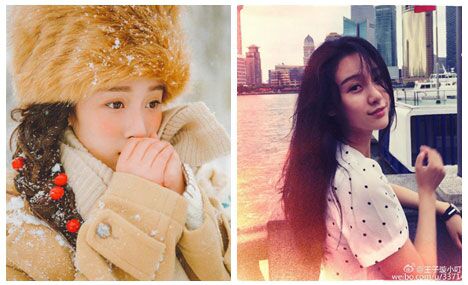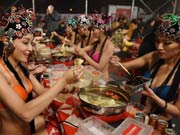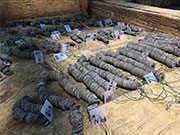

A model wears Chinese-style pieces, part of the Dolce &Gabbana's 2016 spring/summer collection, designed by Italian duo Domenico Dolce and Stefano Gabbana. Photos provided to China Daily
The world-famous fashion designers Dolce and Gabbana, who were back in their favorite market recently, tell Chen Jie how it inspires them.
Chinoiserie (Chinese motifs) featured in European architecture, interior design, gardening and pottery in the late 17th century. Then, villas were decorated or painted in Chinese style in Germany, Sweden, Spain, France, Italy and Russia.
The Chinese Palace in Palermo, Sicily, is one of the largest and most iconic Chinese-style residences built during the Baroque and Rococo periods.
Frederick I (1751-1825), a ruler of the two Sicilies, bought the property which already had an extravagant house with Chinese influence from local nobles.
Then in 1799, he commissioned the famous architect Giuseppe Venanzio Marvuglia (1729-1814), to renovate the wooden house.
Marvuglia obliged the king and, in keeping with the exotic trend popular at the time, created a masterful example of Rococo Chinoiserie with traditional Sicilian elements.
When the Italian designer duo Domenico Dolce and Stefano Gabbana were working on their 2016 spring/summer collection, they happened to see some of the old Dolce &Gabbana advertisements featuring the Chinese Palace.
After seeing the photos, they were "inspired to visit Palermo to see the beautiful and unique Chinese Palace", Gabbana tells China Daily.
 |
Day|Week

 Photos of Beijing Film Academy student hit the Internet
Photos of Beijing Film Academy student hit the Internet Spectacular aerial photos of the Three Gorges
Spectacular aerial photos of the Three Gorges New balls please! Polish sports stars strip off for risqué calendar
New balls please! Polish sports stars strip off for risqué calendar A glance at life of Ukrainian models working in Chongqing
A glance at life of Ukrainian models working in Chongqing Contestants of Mrs. Globe pose for photo in Shenzhen
Contestants of Mrs. Globe pose for photo in Shenzhen
 Bikini models attend hot pot banquet in Hefei
Bikini models attend hot pot banquet in Hefei 118-meter-high Never-used Building in NW. China Demolished
118-meter-high Never-used Building in NW. China Demolished J-10B fighters with homegrown engine in test flight
J-10B fighters with homegrown engine in test flight 10 tons of copper coins unearthed in 2,000 years old ancient tomb
10 tons of copper coins unearthed in 2,000 years old ancient tomb Beautiful graduate from police college becomes Internet hit
Beautiful graduate from police college becomes Internet hit